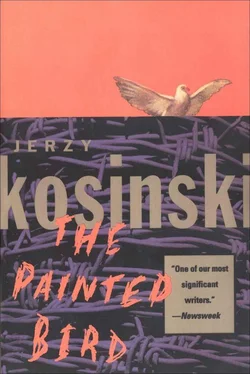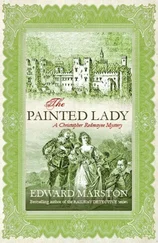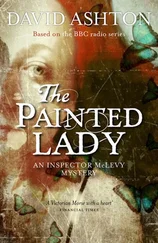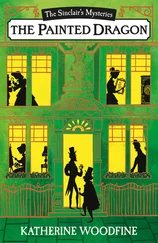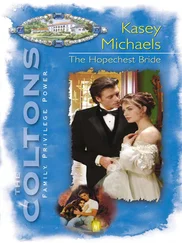Jerzy Kosiński - The Painted Bird
Здесь есть возможность читать онлайн «Jerzy Kosiński - The Painted Bird» весь текст электронной книги совершенно бесплатно (целиком полную версию без сокращений). В некоторых случаях можно слушать аудио, скачать через торрент в формате fb2 и присутствует краткое содержание. Год выпуска: 1965, ISBN: 1965, Жанр: Детская проза, на английском языке. Описание произведения, (предисловие) а так же отзывы посетителей доступны на портале библиотеки ЛибКат.
- Название:The Painted Bird
- Автор:
- Жанр:
- Год:1965
- ISBN:978-0-8021-9575-3
- Рейтинг книги:4 / 5. Голосов: 1
-
Избранное:Добавить в избранное
- Отзывы:
-
Ваша оценка:
- 80
- 1
- 2
- 3
- 4
- 5
The Painted Bird: краткое содержание, описание и аннотация
Предлагаем к чтению аннотацию, описание, краткое содержание или предисловие (зависит от того, что написал сам автор книги «The Painted Bird»). Если вы не нашли необходимую информацию о книге — напишите в комментариях, мы постараемся отыскать её.
The Painted Bird — читать онлайн бесплатно полную книгу (весь текст) целиком
Ниже представлен текст книги, разбитый по страницам. Система сохранения места последней прочитанной страницы, позволяет с удобством читать онлайн бесплатно книгу «The Painted Bird», без необходимости каждый раз заново искать на чём Вы остановились. Поставьте закладку, и сможете в любой момент перейти на страницу, на которой закончили чтение.
Интервал:
Закладка:
We cautiously bypassed a sleeping village. No smoke rose from the chimneys, the dogs and the roosters were silent. Mitka’s face stiffened and his lips became dry. He opened a flask of cold coffee, took a gulp and gave me the rest. We hurried on.
It was daylight by the time we entered the forest, but the woods were still gloomy. The trees stood stiffly like sinister monks in black habits guarding the glades and clearings with the broad sleeves of their branches. At one point the sun found a tiny opening at the top of the trees and the rays shone through the open palms of chestnut leaves.
After some reflection Mitka selected a tall sturdy tree close to the fields on the edge of the forest. The trunk was slippery, but there were knots and broad boughs grew fairly low. Mitka first helped me onto one of the boughs and then handed me the long rifle, the binoculars, the telescope, and the tripod, all of which I hung delicately on the branches. Then it was my turn to help him up. When Mitka, groaning and puffing, and wet with sweat, reached me on the branch, I climbed to the next one. Thus, helping each other, we managed to get almost to the top of the tree with the rifle and all the equipment.
After a moment’s rest, Mitka deftly bent back some branches which obscured our view, cut some of them, and tied others. We soon had a reasonably comfortable and well-concealed seat. Unseen birds fluttered in the foliage.
Growing accustomed to the height, I discerned the outlines of buildings in the village just ahead of us. The first puffs of smoke were beginning to rise into the sky. Mitka attached the telescope to his rifle and fixed the tripod firmly. He sat back and carefully placed the rifle on its support.
He spent a long time scanning the village through the binoculars. Then he handed them to me and began to adjust the telescopic sight of the rifle. Through the binoculars I surveyed the village. Their image amazingly enlarged, the houses seemed to be just in front of the woodland. The picture was so sharp and clear that I could almost count the straws in the thatched roofs. I could see hens pecking in the yards and a dog lazing in the thin sunshine of the early morning.
Mitka asked me for the binoculars. Before handing them back I had another quick glimpse of the village. I saw a tall man leaving a house. He stretched his arms, yawned, and looked at the cloudless sky. I could see that his shirt was wide open in front, and there were big patches on the knees of his pants.
Mitka took the binoculars and placed them beyond my reach. Intently he studied the scene through his telescope. I strained my eyes but, without the glasses, could see only the dwarfed houses far below.
A shot rang out. I started and birds fluttered in the thicket. Mitka raised his red, perspiring face and muttered something. I reached for the binoculars. He smiled apologetically and held back my hand.
I resented Mitka’s refusal, but could guess what had happened. In my imagination I saw the farmer keeling over, reaching above his head with his hands, as if seeking support from an invisible handhold as he slumped on the threshold of his house.
Mitka reloaded the rifle, placing the used cartridge case in his pocket. He calmly inspected the village through the binoculars, whistling softly through tight lips.
I tried to visualize what he saw there. An old woman wrapped in brown rags walking out of the house, looking at the sky, crossing herself, and at the same moment catching sight of the man’s body lying on the ground. As she approached it with clumsy, waddling steps and bent down to turn his face toward her, she noticed the blood and ran screaming toward the neighboring houses.
Startled by her cries, men pulling on their trousers and women only half awake started running out of the houses. The village soon swarmed with people rushing to and fro. The men bent over the body, gesturing wildly and looking helplessly in all directions.
Mitka moved slightly. He had his eye glued to the telescopic sight and was pressing the butt of his rifle to his shoulder. Drops of perspiration glistened on his forehead. One of them broke away, rolled into his bushy eyebrows, emerged at the base of his nose and started along the diagonal ridge of his cheek on its way to his chin. Before it reached his lips, Mitka fired three times in quick succession.
I closed my eyes and saw the village again, with the three bodies sliding to the ground. The remaining peasants, unable to hear the shots at that distance, scattered in panic, looking around in bewilderment and wondering where the shots were coming from.
Fear gripped the village. The families of the dead sobbed wildly and dragged the bodies by their hands and feet toward their houses and barns. Children and older people, unaware of what was happening, milled aimlessly about. After a few moments everyone disappeared. Even the shutters were closed.
Mitka examined the village again. There must have been no one left outside, for his inspection took some time. Suddenly he put aside the binoculars and seized the rifle.
I wondered. It was perhaps some young man sneaking between the houses, trying to evade the sniper and get quickly back to his hut. Not knowing where the bullets came from, he stopped now and then and stared about him. As he reached a row of wild rosebushes, Mitka fired again.
The man stopped as though nailed to the ground. He bent one knee, tried to bend the other, and then just toppled into the rosebushes. The thorny branches shook uneasily.
Mitka leaned on his rifle and rested. The peasants were all in their houses and none dared to come out.
How I envied Mitka! I suddenly understood a good deal of what one of the soldiers had said in a discussion with him. Human being, he said, is a proud name. Man carries in himself his own private war, which he has to wage, win or lose, himself—his own justice, which is his alone to administer. Now Mitka the Cuckoo had meted out revenge for the death of his friends, regardless of the opinions of others, risking his position in the regiment, and his title of Hero of the Soviet Union. If he could not revenge his friends, what was the use of all those days of training in the sniper’s art, the mastery of eye, hand, and breath? Of what value was the rank of Hero, respected and worshiped by tens of millions of citizens, if he no longer deserved it in his own eyes?
There was another element in Mitka’s revenge. A man, no matter how popular and admired, lives mainly with himself. If he is not at peace with himself, if he is harassed by something he did not do but should have done to preserve his own image of himself, he is like the “unhappy Demon, spirit of exile, gliding high above the sinful world.”
I also understood something else. There were many paths and many ascents leading to the summit. But one could also reach the summit alone, with the help at most of a single friend, the way Mitka and I had climbed the tree. This was a different summit, apart from the march of the working masses.
With a kind smile Mitka handed me the binoculars. I peered eagerly at the village, but saw nothing except tightly shut houses. Here and there a hen or a turkey strutted. I was just about to hand the glasses back to him when a big dog appeared between the houses. It wagged its tail and scratched its ear with a hind leg. I remembered Judas. He had done just that as he scowled at me hanging on the hooks.
I touched Mitka’s arm, pointing to the village with my head. He thought I meant that people were moving and he concentrated on the telescopic sight. Seeing no one, he looked at me questioningly. I told him with signs that I wanted him to kill the dog. He showed surprise and refused. I asked him again. He refused, looking at me with disapproval.
We sat in silence, listening to the fearful rustle of the leaves. Mitka surveyed the village again, then he folded the tripod and removed the telescopic sight. We started down slowly; Mitka sometimes muttered from pain as he hung by his arms searching for a foothold below.
Читать дальшеИнтервал:
Закладка:
Похожие книги на «The Painted Bird»
Представляем Вашему вниманию похожие книги на «The Painted Bird» списком для выбора. Мы отобрали схожую по названию и смыслу литературу в надежде предоставить читателям больше вариантов отыскать новые, интересные, ещё непрочитанные произведения.
Обсуждение, отзывы о книге «The Painted Bird» и просто собственные мнения читателей. Оставьте ваши комментарии, напишите, что Вы думаете о произведении, его смысле или главных героях. Укажите что конкретно понравилось, а что нет, и почему Вы так считаете.
